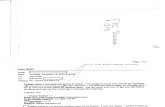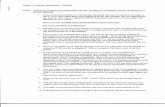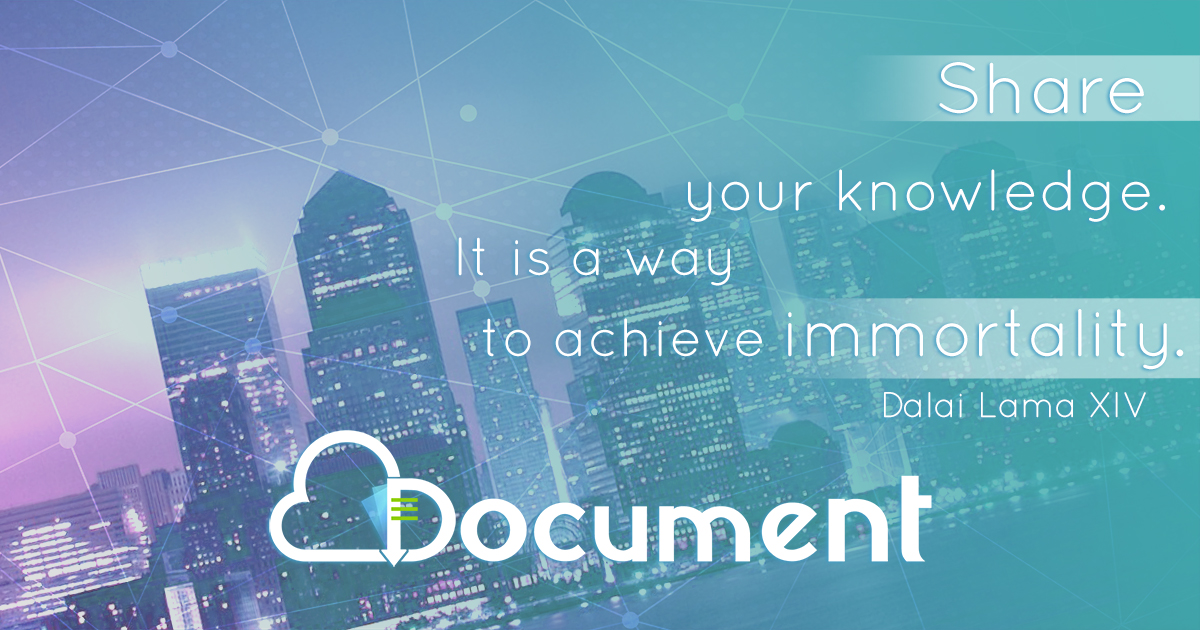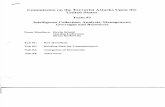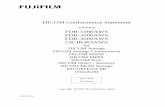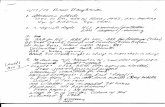T7 B19 FBI Briefing Fdr- FBI Briefing and QFR- Emails- Memos- Notes- Questions 571
DM B4 Gordon-Ridge Fdr- Draft Questions for Tom Ridge and Emails Re Questions 315
-
Upload
911-document-archive -
Category
Documents
-
view
213 -
download
0
Transcript of DM B4 Gordon-Ridge Fdr- Draft Questions for Tom Ridge and Emails Re Questions 315
-
8/14/2019 DM B4 Gordon-Ridge Fdr- Draft Questions for Tom Ridge and Emails Re Questions 315
1/13
Page 1 of 1
Dan MarcusFrom: Christine HealeySent: Thursday, April 29, 2004 10:26 AMTo: Dan MarcusSubject: FW: Pre-Meeting for Ridge meeting
Dan - Here areWarren's questions - they cover lots of bases. Also Bill Johnstone suggested we ask Ridgeabout changes in the one-size-fits-all threat alert system and other general questions about making the publicappropriately aware of risks. Today's story about bioterrorism was interesting. DHS was criticized for keeping toomuch information secret and not educating and preparing the public. ChrisOriginal Message
From: Warren BassSent: Thursday, April 29, 2004 9:56 AMTo: Christine HealeyCc: Mike HurleySubject: FW: Pre-Meeting for Ridge meetingHere you go, Chrissorry to be late on this. (W as stuck in writing h ell yesterday, and it just slipped my addledmind.)Ridge isn't a huge deal for us, but we've got a few things.Our basic question is: how does DHS lash up with th e rest of the post-9/ii CT structure?Beyond that:
How does R idge interact with othe r principals? Who has the lead during an alert? Whodoes what? Wh at stovepipes still persist? How far are we from hav ing a functioning, truly integrated DHS? O ur impression is that it's still a mess. How does DHS interact with the NSC , including OCX and wh at's become of the CSG? Howdoes Ridge interact with F ran Townsend at NSC? Howdoes the Wh ite House H ome land Security Council interact with DHS? What's right/wrongwith this system? Howdoes DHS receive, consum e, analyze,and use intel? W ha t's Ridge's daily intel take? How does the DHS budget process work? How does the DHS oversight process work? How much of Ridge's time is spent before congressionalcommittees? Does DHShave an ability to do "red team" planning ? Howdoes it try to anticipate a ttacks and identifyvulnerabilities?
4/29/2004
-
8/14/2019 DM B4 Gordon-Ridge Fdr- Draft Questions for Tom Ridge and Emails Re Questions 315
2/13
Page 1 o f 2
Lorry FennerFrom: Lloyd SalvettiSent: Thursday, April 29, 2004 1:16 PMTo: Lorry Fenner; Christine HealeyCc: Team 2Subject: RE: Pre-Meeting for Ridge meeting
Chris:In addition to the points Lorry raises in her note I have two Q's for possible use with Ridge:
1.) In our interview of Hughes he said that DHS/IA has no automated data handling system, no data base forcommon use and no data mining tools although DHS/IA has full connectivity with the intelligence anddefense communities. What is his plan and priority for acquiring the IT systems that will enableDHS to integrate and analyze intelligence information from all sources? (I think the biggerquestion is: what are his IT priorities for DHS, what is his timetable and does he have theresources (both people and $$$) to accomplish his objectives?)2.) Hughes said that the flow of information from the intelligence and law enforcement community is "not asgood as it could be" requiring DHS/IA to "pull" information from those communities rather than having it"pushed" to DHS. What are the biggest obstacles to carrying out his mission has he encounteredin his department's relationships with the intelligence and law enforcement communities,especially the CIA, TTIC and then FBI?Who has the responsibility for communication of threat information to state/local officials - DHSor the FBI?Wh o has the responsibility for communication of threat information to the private sector - DHS orthe FBI?
Good luck,Lloyd
Original MessageFrom: Lorry FennerSent: Thursday, April 29, 2004 11:01 A MTo: Christine HealeyCc: Team 2Subject: FW : Pre-Meeting for Ridge meetingAt the April hearing, the relationship between DHS/IA, TTIC, CTC and FBI's CTD is still unclear, can youclarify what is the value added of DHS/IA for you/the department and to the national security in general?Does DHS/IA get all the information it needs from TTIC, CIA, FBI, state and local LE?Again at the hearing, this was unclear, who has responsibility for operational and strategic level warning(as opposed to tactical) to the President and senior leaders, and to ensure action is taken. Today -would the FAA, INS, HHS, CDC, Port Authority, etc, take more appropriate measures in the months andyears (as opposed to the days) before a 9/11 based on IAIP and DHS work/activities?If the Intelligence Community was reorganized or new DNI installed what would be the impact on DHSand specifically on IAIP?Thank you
5/12/2004
-
8/14/2019 DM B4 Gordon-Ridge Fdr- Draft Questions for Tom Ridge and Emails Re Questions 315
3/13
Questions for Secretary Ridge
1. What is the value of the Homeland Security Council in the day to day activities ofthe Department, especially the border security issues? Help or hindrance?
2. Are you confident that Congress will stick by US VISIT and mandate and fund theprogram that you think is needed? , , -01 -
-
8/14/2019 DM B4 Gordon-Ridge Fdr- Draft Questions for Tom Ridge and Emails Re Questions 315
4/13
Commission's eleventh public hearing on "Emergency Response "M ay 18-19, 2004New School University in New York CityQuestions for Tom Ridge, Secretary of Homeland Security1. Has DHS developed a methodology for identifying emergency preparedness requirements!
Have threats been identified, capabilities for addressing threats determined and requirementsgenerated for establishing or gaining access to necessary capabilities? What do emergencyresponders need to be prepared for - beyond local fires, hazmat incidents or naturaldisasters?
2. What is DHS doing to promote what is called a regional approach to emergencypreparedness and response?
a. Has a strategy for regionalization been developed to encourage states to organizeintra-regionally as a sustainable way to manage emergency response resources?
b. Is DHS requiring all states to submit statewide mutual assistance plans as arequirement for receiving homeland security grants?
c. DHS has allocated or awarded over $8 billion to assist and equip our nation's firstresponders, how is this money tracked to ensure it furthers a regional approach andenhances regional capabilities rather than limited parochial interests? Are grantsbeing structured to reward the pooling of assets across jurisdictional lines?
d. How might DHS foster a regionalization strategy that would allow for maximumcoverage and adequate redundancy within a state?
3. Integrating the federal government with state governments in a coordinated way in order tobring resources to bear against any given disaster has always been our single biggestchallenge. In addition to a National Response Plan (NRP) and a National IncidentManagement System (NIMS), what is being done to address this integration concern?
a. Who is in charge at the federal level during the next terrorist attack - DHS,DoJacting through the FBI, or DoD acting through NORTHCOM? Have the appropriaterelationships and mechanisms for cooperation and coordination been establishedbetween you and the Attorney General and the Secretary of Defense?
4. Some states have combined their emergency management agency and homeland securitydepartment into one department (such as Iowa). Other states have two separate departments(such as Alabama). Are you concerned that a bifurcation of emergency management andhomeland security is taking place, which may create an unnecessary layer of bureaucracy andimpede effective command, control and coordination during an actual disaster, particularly aterrorist incident?
a. Who is in charge at the state and local level - emergency management directors,homeland security directors, or public health directors? And do they know who tocommunicate with at the federal level?
-
8/14/2019 DM B4 Gordon-Ridge Fdr- Draft Questions for Tom Ridge and Emails Re Questions 315
5/13
Commission's eleventh public hearing on "Emergency Response "M ay 18-19, 2004New School University in New York City5. How does DHS balance concern for terrorism versus other types of threats and hazards? Arewe becoming fixated on terrorism so much at we "Can't see the forest through the trees"when it comes to a future natural disaster? Is the "all hazards "approach to emergency
management still valid in a post-9/11 world or is a "terrorism-centric "approach nownecessary?
a. Is the recent move by DHS of the Firefighters Grant Program from FEMA to theOffice for Domestic Preparedness indicative of a more "terrorism-centric " approachto emergency management? FEMA does oversee the U.S. Fire Administration.6. What national guidelines exist fo r determining the burden-sharing between the federal
government and state and local jurisdictions? Of course primary responsibility for fundingnormal levels of emergency preparedness and public health rest with state and localjurisdictions, bu t what federal funds are available to cover th e costs of meeting a nationalstandard in response to the national security threat posed by terrorism?Does Congress currently, or is there any chance that Congress will accompany authorizationsfor emergency responder assistance grants with budget authority fo r sustaining those grantsthrough at least two fiscal years in order to provide sustained multiyear funding for state andlocal governments?
8. What is being done to allow states greater flexibility in using past homeland securityfunding? Are you currently able to grant a state a waiver of federal guidelines in order forstates to better allocate resources according to their most urgent needs?
9. Do DHS's new technical specifications for a baseline interoperable communications systemeliminate the need for first responders to have CPAS (Cellular Priority Access Service)?
10. Have yo u given consideration to moving the Office of Domestic Preparedness (OOP) fromthe Bureau of Border and Transportation to the Office of State and Local GovernmentCoordination? Would not such a move help consolidate oversight of grants to emergencyresponders with your office - the Office of the Secretary?
11. Have you given consideration to establishing within DHS a National Institute for BestPractices in Emergency Preparedness to promote a universal best practices/ lessons learnedknowledge base? Where can first responders currently go for such information?
12 . What's the status of TOPOFF, DHS's comprehensive national program for exercise? What'snext after TOPOFF 2, which was completed last May?a. What are the most important lessons you've learned from these exercises?
13. Is DHS looking at expanding the capacity of existing training facilities involved in theNational Domestic Preparedness Consortium or identifying any new training facilities fo remergency responders that may be required?
-
8/14/2019 DM B4 Gordon-Ridge Fdr- Draft Questions for Tom Ridge and Emails Re Questions 315
6/13
Commission's eleventh public hearing on "Emergency Response "M ay 18-19, 2004New School University in New York City14. Why did it take 5 months to fill the vacancy for Director, Office of National Capital RegionCoordination? What constraints did DHS face in filling this position?15. Has Congress effectively streamlined the number of committees overseeing DHS? Or do 88
committees and subcommittees continue to have jurisdiction over pieces of your department?
-
8/14/2019 DM B4 Gordon-Ridge Fdr- Draft Questions for Tom Ridge and Emails Re Questions 315
7/13
Questions for Ridge on Visa Policy and Relations with State1. Backgro und: Section 428 of the HSA vests in the Secretary the authority tocontrol visa policy administered by State Department consular officers, and topost DHS personnel at "each diplomatic and consular post at which visas are
issued." W e have been told that D HS/ICE personnel in Saudi Arabia overseeingconsular work are doing little more than checking records in DH S databases.Does the Secretary see this work as important for homeland security, how doesthe Secretary envision the use of such overseas DHS personnel over the longterm, and what kind of expansion of this overseas function would you like to see?
2. Does the Secretary believe there would be value in having more cross-trainingbetween consular officers and, for example, CBP border inspectors?3. Would the Secretary support creation of a new entity that fused mo re than theHAS does the consular function at State with the border screening function withinDHS at CBP?
-
8/14/2019 DM B4 Gordon-Ridge Fdr- Draft Questions for Tom Ridge and Emails Re Questions 315
8/13
QUESTIONS FOR INTERVIEW OF SECRETARY RIDGE
WHITE HOUSE SERVICE/HOMELAND SECURITY COUNCIL
1 .
2.
4.
Please discuss the lessons that you learned about homeland security during yourtenure as the President's homeland security advisor before you became secretaryof the department.What did you determine was the appropriate role for the White House incoordinating efforts to protect against threats to the homeland when you were inthe W hite House? How have your views changed over the past year while youhave served as secretary?
6.
A March 2004 RA ND paper, "Coordinating the War on Terrorism," argues thatthe existence of the NSC , HSC and their supporting interagency comm ittees leadsto "complex interactions and a blurring of lines of responsibility." Do you agree?Does it make sense to have both a Homeland Security Council and a NationalSecurity Council? What is right and wro ng with this two-council structure?How do you interact with other principals - for instance with Secretary Thom psonon bio-terrorism, with A ttorney General Ashcroft or Director Mueller onintegrating watch lists and comm unicating w ith state and local governmentofficials - inside andoutside theWhite House process?How do you (and the Department) interact with the National Director forCombating Terrorism (Townsend), the HSC (Gordon), the NSC (Rice) and theinteragency working groups? A re any structural changes anticipated withGordon's departure?W ho has the lead during an alert? Please explain the interagency process leadingup to a decision to elevate the threat level or alert the public to a threat. W ho doeswhat? How has the process evolved from 9/11? Over the New Year the federalgovernment appeared to be on a heightened threat level but no t the cpuntry as awhole, will this become the norm?Where are interagency connections and coordination processes work ing well?Where do stovepipes and problems persist?Do you agree with the recent National Journal article that reported theA dm inistration sees terrorism as a problem to be fought "over there" and is givinginsufficient attention to readiness and defense against terrorism at home? Why orwhy not?
DEPARTMENT OF HOMELAND SECURITY
How does the Department (and how do you) receive, consume, analyze and useintelligence? Who is your primary intelligence advisor? What are the bestsources of intelligence you receive each day? Specifically, how do you gradeintelligence you receive from the FBI, the CIA , and the various elements of theDepartment of Homeland Security?
7.
-
8/14/2019 DM B4 Gordon-Ridge Fdr- Draft Questions for Tom Ridge and Emails Re Questions 315
9/13
2. The Bureau of Information Analysis an d Infrastructure Analysis was consideredby many in the Congress to be the most innovative an d important entityauthorized within the new department - yet it is widely regarded to have been oneof the weakest aspects of DHS so far: short-staffed; high turnover of leadership;unable to make a comprehensive assessment of infrastructure vulnerabilities; itsfunction usurped in part by the Terrorist Threat Integration Center. What is yourassessment of the IA/IP today? What do you see it realistically achieving in fiveyears? '3. DHS has its own intelligence centers (e.g., TA/TP3^f!nast. Guard, and-SecretService) andparticipates in TTIC and the I orist Screening Center. JgBI has aCounterterrorism Division. NORTHCOM has a msion^enteTurCoIorado. Whosees to it that all these centers work together? What is your general philosophy onthis? Do we need this many or more intelligence centers to increase coverage andto promote specialized analysis, such as with transportation modes; or do we need
-
8/14/2019 DM B4 Gordon-Ridge Fdr- Draft Questions for Tom Ridge and Emails Re Questions 315
10/13
either fearful or angry, and that, if used responsibly, information could be used tobetter com mu nicate the actua l degree of risk. Given tha t the primary goal of terrorists is to create terror, could thegovernment have done a better job in communicatingwith the publicabout terrorist threats before, during and after September 11,2001? What has DHS done in trying to balance the need to promote continuedvigilance, with the need to combat the "terror" of terrorism? What more could or should be done in this respect?11. Wha t are your views on the Congressional oversight of the Department? Whereis oversight being conducted constructively? Are there any advantages to the
House's approach with its select committee over the Senate's approach whereGovernment Affairs appears to have the m ain role in oversight but no new entitywas created? Wha t about in the appropriations process?12. The American Na tional Standa rds Institute (ANSI) has recomm ended that thepu blic sector standa rds produced for the National Fire ProJeetiolfAssociationshould serve as the basis for similar private sector standards to use in setting uptheir emergency preparedness and continuity obusiness standards. Would theDepartment consider encouraging the private'sector to-^dopt these standards?13. There are a mu ltitude of issues concerning border and im migration policy.[PLACEHOLDER TO BE FILLED BY TEAM 5]
OTHER TOPICS
1. Wha t are the urgent problems in homeland security that no one is talking abou t orthinking abou t right now?2. Are there any other issues we should discuss?3. What recommendations should the 9-11 Commission make to have the greatestimpact on homeland security?
-
8/14/2019 DM B4 Gordon-Ridge Fdr- Draft Questions for Tom Ridge and Emails Re Questions 315
11/13
Questions for Secretary Ridge
1. What is the value of the Homeland Security Council in the day to day activities o fthe Departme nt, especially the border security issues? Help or hindrance?2. Are you confident that Congress will stick by US VISIT and mandate and fund theprogram that you think is needed?3. Do you envision that the eventual US VISIT-based border screening system ~which w ould encompass the border process from visa through naturalization ~would also incorporate TSA information on passenger travel?4. Deputy Secretary Loy told us that he thought a border policy group at the D eputySecretary level would be useful to coordinate CIS and BTS interests, andtechnology issues that transcend the individual agencies. What is the status ofbuilding a policy unit?5. What do you see as the overall mission of ICE at DHS?6. As you know w e learned that a legacy INS inspector was the only inspector toturn away a potential hijacker. He did so based on an intimate know ledge ofimm igration law, backed up by supervisors versed in imm igration law . Are youconcerned that virtually all senior field positions h ave been assigned to legacyCustoms officials who are not trained in immigration law and yet are responsibledecisions on removals such as Kahtani's?
/ 7. What do you see as the biggest obstacles to further collaboration with Canada,' Mexico and the Europeans on border security issues? What should be done tomove cooperation with the Europeans forward? Mexico?
8. With your new authority over visa policy, have you and the Department of Stateconducted an assessment o f visa policy? Do you think changes are needed?
-
8/14/2019 DM B4 Gordon-Ridge Fdr- Draft Questions for Tom Ridge and Emails Re Questions 315
12/13
Page 1 of 1
Dan MarcusFrom: Chris KojmSent: Wednesday, May 12, 2004 8:33 AMTo: Lee HamiltonCc: Front Office; Emily WalkerSubject: ANSI recommendation: Talking points fo r the Tom Ridge meeting
Lee - At som e point in the Ridge meeting, or imm ediately afterward, we would like you to hand Ridge the draftrecommendation from the American National Standards Institute. Em ily will provide it to you. The talking pointsare pretty straightforward:Mr. Secretary, we've asked the American National Standards Institute to give the Commission somerecomm endations o n emergency preparedness.This group, ANSI, has no w provided us with a recom mendation for a voluntary standard on private sectoremergency preparedness.We have come to no judgment as a Com m ission, but we will look at this recommendation very seriously.It builds on wo rk by DHS. DHS people participated in the process when ANSI held meetings to try tobuild a consensus with interested parties, including many from the private sector.Your support for this recomm endation w ould give it some very important traction.We don't want to ask you about it today, but we will want to ask you your views on this recomm endationwhen you testify before the Com m ission next week.
5/12/2004
-
8/14/2019 DM B4 Gordon-Ridge Fdr- Draft Questions for Tom Ridge and Emails Re Questions 315
13/13
Page 2 o f 2
Original MessageFrom: Kevin ScheidSent: Thursday, April 29, 2004 10:32 AMTo: Team 2Subject: FW: Pre-Meeting for Ridge meetingFYI... Attached are questions for Ridge that Warren proposed. If you have an y additional questions,comments, issues please send them directly to Chris Healey.Thanks.KJS
Original MessageFrom: Christine HealeySent: Thursday, April 29, 2004 10:27 AMTo: Kevin ScheidSubject: FW: Pre-Meeting for Ridge meeting
Original MessageFrom: Warren BassSent: Thursday, April 29, 2004 9:56 AMTo: Christine HealeyCc: Mike HurleySubject: FW: Pre-Meeting for Ridge meetingHere you go, Chrissorry to be late on this. (Was stuck in w riting hell yesterday, and it just slipped m yaddled mind.)Ridge isn't a huge deal for us, but we've got a few things.Our basic question is: how does D HS lash up with th e rest of the post-g/ii CT structure?Beyond that:
Howdoes Ridge interact with o ther principals? Who has the lead during an alert? Whodoes what? W hat stovepipes still persist? How far are we from having a functioning, truly integrated DHS? Our impression is that it's still amess. How does DHS interact with the NSC, including OCT and what's become of the CSG? Howdoes Ridge interact with Fran Tow nsend at NSC? Howdoes the W hite House H om eland Security Co uncil interact with DHS? What's right/wrongwith this system? Howdoes DHSreceive, consum e, analyze, and use intel? Wh at's Ridge's daily intel take? How does the DHS budget process work? Howdoes the DHSoversight process w ork? Howmuch ofRidge's tim e is spent beforecongressional committees? Does DHShave an ability to do "red team" plannin g? Howdoes it try to anticipate attacks andidentify vulnerabilities?
5/12/2004

